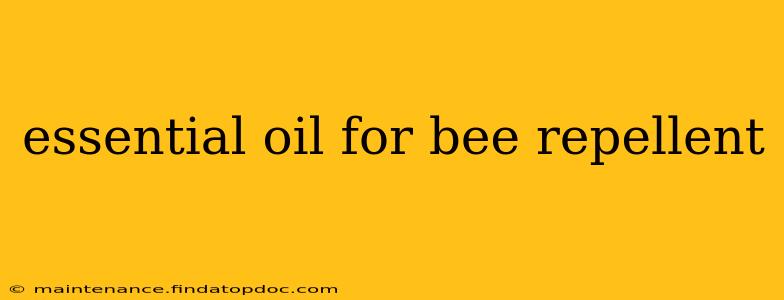Bees are vital pollinators, but their stings can be painful and even dangerous for those with allergies. While it's crucial to respect bees and their environment, understanding how to deter them from unwanted areas can be beneficial. This guide explores the effectiveness of essential oils as a bee repellent and addresses common concerns. Remember, while essential oils can be a helpful deterrent, they are not foolproof, and a respectful distance from beehives is always recommended.
What Essential Oils Repel Bees?
Several essential oils exhibit properties that can discourage bees. However, it's crucial to understand that these oils mask scents that attract bees, rather than actively poisoning or harming them. The effectiveness varies depending on the concentration, the species of bee, and environmental factors. Some of the most commonly cited oils include:
- Lemon Eucalyptus Oil: Studies suggest this oil is particularly effective. Its strong, citrusy scent can mask floral aromas that attract bees.
- Citronella Oil: A widely used insect repellent, citronella oil's strong scent can also deter bees to some extent.
- Peppermint Oil: The pungent aroma of peppermint oil can be unpleasant to bees, making it a potential deterrent.
- Clove Oil: The strong, spicy scent of clove oil is another option that might discourage bees.
- Tea Tree Oil: While less researched for bee repellent, tea tree oil's strong scent could also provide some level of deterrence.
Important Note: Always dilute essential oils properly before use. Undiluted essential oils can be irritating to the skin and potentially harmful to bees.
How Effective are Essential Oils as Bee Repellents?
The effectiveness of essential oils as bee repellents is a subject of ongoing research and debate. While anecdotal evidence and some smaller studies suggest a degree of effectiveness, it's crucial to manage expectations. Essential oils are not a guaranteed method to keep bees away completely. Their effectiveness can be influenced by several factors:
- Concentration: A higher concentration of the oil generally leads to a stronger repellent effect. However, this must be balanced with safety considerations for both humans and the environment.
- Bee Species: Different bee species may react differently to various essential oils.
- Wind Conditions: Wind can quickly dissipate the scent of the essential oil, reducing its effectiveness.
- Proximity to Beehives: If a beehive is nearby, the strong attraction of the hive may override the repellent effect of essential oils.
Are Essential Oil Repellents Safe for Bees?
The use of essential oils as bee repellents raises concerns about their impact on bee health and the environment. While these oils are generally considered safe when used in appropriate dilutions, high concentrations or improper application could potentially harm bees. It's vital to use them responsibly and sparingly. Supporting bee populations is crucial, and focusing on methods that don't harm them is essential for environmental sustainability.
What are Better Alternatives to Essential Oils for Bee Deterrence?
While essential oils might offer some level of deterrence, more effective and humane methods exist for keeping bees away:
- Remove attractants: Bees are attracted to sweet scents and sources of food. Eliminating these attracts from your area is a more effective approach.
- Professional Bee Removal: If you have a beehive on your property, it is best to contact a professional beekeeper for safe and humane removal.
- Physical Barriers: Use screens or netting to prevent bees from entering specific areas.
- Bee-Friendly Landscaping: Plant bee-friendly flowers away from areas you want to protect.
How to Use Essential Oils to Deter Bees (If Choosing This Method)?
If you decide to use essential oils as a bee deterrent, remember to always dilute them properly in a carrier oil like jojoba or almond oil. Apply the diluted mixture sparingly to the affected area. Reapplication may be necessary, especially in windy conditions. Never spray directly onto bees.
Can I make my own bee repellent spray with essential oils?
Yes, you can create a simple bee repellent spray using essential oils. However, remember that the effectiveness is not guaranteed and you must dilute your oils thoroughly with a carrier oil such as jojoba, almond, or even water. Experiment with different essential oil combinations and monitor the results carefully. Always test a small area first for skin sensitivity before widespread application.
This guide provides information regarding the use of essential oils for bee repellent. It's crucial to understand that this method is not always effective and should be considered a supplementary, rather than primary, approach to bee deterrence. Prioritizing bee safety and employing environmentally friendly solutions is paramount.
